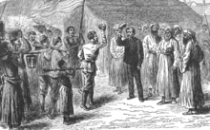
‘Dr Livingstone, I presume?’ So spoke Henry Morton Stanley, New York Herald journalist, 142 years ago when he encountered the missionary and explorer David Livingstone in Ujiji, a trading centre on the eastern shore of Lake Tanganyika. The immortal phrase has somehow lived on in popular consciousness and even today is likely to provoke a wry smile. But why was this phrase ever funny at all? What is it in our cultural memory that makes us want to chuckle? Asking such a question risks the faux pas of trying to explain a joke – but I’m going to ask it nonetheless. For the Victorians, there was certainly more than a little dose of anti-Americanism involved. To many, the rather dignified introduction seemed like an American attempt to ape British manners. Here was a Yank, some laughed, overacting the part of the reserved and decorous gentleman. No doubt this was provoked in part by British jealousy that an American journalist should have succeeded in ‘finding’ the ‘lost’ Dr Livingstone where British expeditions had failed. Of course, part of the amusement was that such an introduction seemed far too formal for a meeting in Africa. Wouldn’t the two men have been so delighted to see each other that formalities might have been laid to one side? Surely, thought the Victorians, this wasn’t a time for niceties! One can see the point. Nevertheless, there’s perhaps another layer at work here. Such a greeting was deemed out of place not least because of contemporary notions about Africa itself. These standards of civility were not expected in such a ‘barbarous’ location. Indeed, the joke relied on an imagined encounter between two white men, culturally isolated and starved of civilised company. As Clare Pettitt suggests, it thus had an underlying racial logic. The joke presumed (pardon the pun) that Africa was a place of savagery, and was built on the failure to appreciate the complex modes of ‘etiquette and civility’ operating in the African societies through which Livingstone journeyed. It was, however, Livingstone’s own understanding of such codes that enabled him to travel successfully and safely through so many different parts of the continent.
There are surely other ways of ‘explaining’ the joke, so do feel free to leave your comments below. For now though, here are a couple of ‘Dr Livingstone, I Presume?’ clips for you to enjoy. The first is from the 1939 Hollywood blockbuster, Stanley and Livingstone, and the second is from a well-known TV show….
http://www.youtube.com/watch?v=ngggl6Afc3E
http://www.youtube.com/watch?v=goN5zFxZmMw
My thoughts above are provoked by current events in Scotland, since this month marks the bicentenary of David Livingstone’s birth. This has already been celebrated in a number of events in Scotland and the rest of the UK. At the National Museum of Scotland, there is currently a major exhibition on his life and work (http://www.nms.ac.uk/our_museums/national_museum/dr_livingstone,_i_presume.aspx). This ends on 7th April, so there isn’t long left to see it! Our own university hosted a symposium on Livingstone and tropical disease, as well as a public lecture by former First Minister of Scotland, Lord McConnell. The university also produced a short film on Livingstone’s life and legacy, which you can watch here: http://local.stv.tv/glasgow/magazine/215041-legacy-of-livingstone-remembered-in-glasgow-university-video/
There are still many other events to come! On Friday 15th March, Professor John MacKenzie is speaking at the National Museum of Scotland, and a conference on ‘Livingstone’s Legacy in Africa and Scotland’ is scheduled for the next day in New College, Edinburgh. As well as a memorial service in Westminster Abbey (19th March), the events planned range from performance pieces to African drumming workshops. A full list of the activities, exhibitions and talks can be found on the ‘Livingstone 200’ website:
http://www.davidlivingstone200.org/events.php
The extent of all this activity may be surprising, particularly for a figure so integrally connected to the British Empire. Indeed, he is almost alone among imperial heroes in being publicly remembered in a positive fashion. Part of this is possible, of course, because of Livingstone’s favourable remembrance in Africa. Where most colonial place names were removed following independence, those connected with Livingstone – Blantyre and Livingstonia in Malawi, for instance – have been retained. But while this certainly indicates that Livingstone is an exceptional case, I wonder if the current celebrations are proving quite selective. He’s seamlessly linked to a narrative of ‘development’ (as the forerunner of the Scotland-Malawi Partnership), but there’s less talk about his connection to imperialism. This is not to deny that Livingstone is worthy of commemoration: I, for one, think he is. But I also think there needs to be greater reflection on our patterns of remembrance. We might simply pause to ask why Livingstone continues to attract such attention today. What politics are involved in his current memorialisation? And how should we go about responsibly remembering a figure like Livingstone, who is so bound up with our imperial past?

